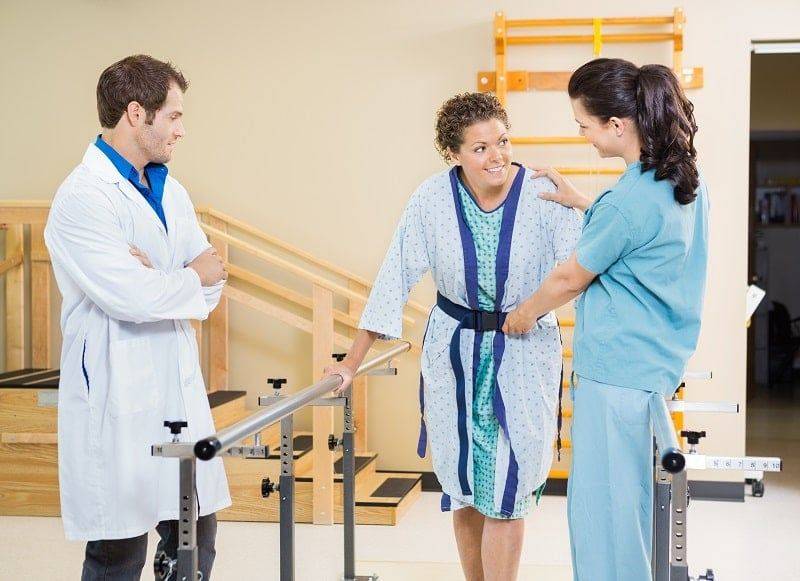Do you enjoy helping people? Are you looking for a career that is both challenging and rewarding? If so, then you may want to consider becoming a physical therapy assistant! Physical therapy assistants work with physical therapists to help patients regain strength and mobility after an injury or illness. They perform exercises, provide massages, and give other treatments that help patients recover as quickly as possible. If this sounds like the perfect career for you, keep reading to learn more about what it takes to become a physical therapy assistant!
Contents
- 1 What Does Physical Therapy Assistant Do?
- 2 Skills Required To Become A Physical Therapist Assistant
- 3 How To Become A Physical Therapy Assistant
- 4 How Much Salary Does a Physical Therapy Assistant Make?
- 5 What Does Physical Therapy Assistant Job Entail?
- 6 Is Physical Therapy Assistant A Good Job?
- 7 Conclusion
What Does Physical Therapy Assistant Do?
 Physical Therapy Assistants (PTAs) are healthcare professionals responsible for providing physical therapy services to patients under the direction and supervision of a Physical Therapist. They may help with exercises, massage, gait training and other therapeutic activities that aid in rehabilitation after an illness or injury. PTAs also provide education on proper technique and safety for various therapeutic activities.
Physical Therapy Assistants (PTAs) are healthcare professionals responsible for providing physical therapy services to patients under the direction and supervision of a Physical Therapist. They may help with exercises, massage, gait training and other therapeutic activities that aid in rehabilitation after an illness or injury. PTAs also provide education on proper technique and safety for various therapeutic activities.
In addition to providing physical therapy services, PTAs may also be responsible for scheduling appointments, handling medical paperwork, keeping records of patients’ progress and performing clerical duties as needed. They may also help with equipment maintenance and ordering supplies. It is important that PTAs stay up-to-date on new treatments and techniques, as well as any changes in regulations or licensure requirements.
Skills Required To Become A Physical Therapist Assistant

To be a successful Physical Therapy Assistant, you should have the following skills:
- Understanding of anatomy, physiology, and other medical terminology
- Ability to communicate effectively with physical therapists, patients and their families
- Knowledge of therapeutic techniques used in a clinical environment
- Proficient multi-tasking skills
- Problem-solving capabilities
- Excellent interpersonal skills
- Ability to work independently as well as part of a team
- Ability to observe and assess patient movement, muscle tone, coordination, and range of motion
- Knowledge of safety protocols for medical equipment used
- A compassionate and caring attitude towards patients.
Having these skills will help you excel in the Physical Therapy field. You should also have the ability to quickly learn new techniques and be open to feedback from your physical therapist. Taking continuing education classes is a great way to stay up to date on the latest treatments and methods used in this field. You should also be prepared for long hours of active work, as you will typically be helping patients with their rehabilitation activities.
In addition to these skills, having an educational background in healthcare and related fields is essential. Most Physical Therapy Assistants hold an Associate’s degree or a certificate from an accredited physical therapy program. Those who have a bachelor’s degree in exercise science, biology, health sciences, or other related fields may also find employment as a Physical Therapy Assistant.
How To Become A Physical Therapy Assistant
 If you are looking for a satisfying and rewarding career in the healthcare field, becoming a physical therapy assistant might be just the right fit. A physical therapy assistant (PTA) works closely with patients to provide therapeutic treatments that help restore mobility and reduce pain. With additional education and certifications, PTAs can also assist physical therapists in developing treatment plans and providing services to patients.
If you are looking for a satisfying and rewarding career in the healthcare field, becoming a physical therapy assistant might be just the right fit. A physical therapy assistant (PTA) works closely with patients to provide therapeutic treatments that help restore mobility and reduce pain. With additional education and certifications, PTAs can also assist physical therapists in developing treatment plans and providing services to patients.
So how do you become a physical therapy assistant? Let us break down the steps for you:
Education
To qualify to become a PTA, you must first complete an accredited two-year associate degree program in physical therapy assistance from a college or university. During your training, you will learn about human anatomy and physiology, medical terminology, rehabilitation techniques and patient safety standards.
Licensing
After completing your degree program, you must also obtain the appropriate licensing from the state you plan to practice in. In some states, a passing score on the National Physical Therapy Examination (NPTE) is required for licensure. You will also need to complete any other additional requirements in order to become fully licensed and certified in your state.
Experience
Once you have obtained all the necessary certifications and qualifications, you may need to complete a clinical internship or practicum before beginning work as a physical therapy assistant. This will typically involve assisting physical therapists with patient treatments, learning about administrative tasks, keeping records and providing support services to patients.
By taking the right steps and obtaining the proper qualifications, you can become a physical therapy assistant and embark on an exciting and rewarding career. With the right training and experience, your career as a PTA could open up many opportunities to serve patients in need.
How Much Salary Does a Physical Therapy Assistant Make?
A physical therapy assistant (PTA) is an important part of the rehabilitation team. They provide aid to physical therapists in patient care, helping patients improve mobility and function, manage pain, and prevent further injury. These professionals are essential for providing quality healthcare services to those in need.
In terms of salary, physical therapy assistants earn an average of INR 25,000 per month. Salaries may vary based on experience and geographic location. PTAs with more experience typically receive higher salaries than those who are just starting out. In addition to base pay, many employers offer bonuses and other incentives which can increase the overall compensation package for physical therapy assistants.
The field which pays the most for physical therapy assistants is orthopaedics, with an average salary of INR 28,000 per month. Other fields such as geriatrics and neurology also pay well for PTAs, with average salaries ranging from INR 23,000 to 25,000 per month respectively.
Work hours vary depending on the employer and the PTA’s job duties. Most PTAs work full-time, with shifts ranging from 8-12 hours per day. Some may be required to work on weekends and holidays as well.
What Does Physical Therapy Assistant Job Entail?
 The job of a physical therapy assistant involves the following duties:
The job of a physical therapy assistant involves the following duties:
- Assisting physical therapists with patient treatments, providing rehabilitation services and helping patients improve their range of motion and strength.
- Physical Therapy Assistants must be familiar with a variety of therapeutic exercises and treatment modalities such as ultrasound, heat/cold therapy and electrical stimulation. They must also possess strong communication skills in order to effectively communicate the instructions from physical therapists to the patients.
- Furthermore, physical therapy assistants must be able to maintain accurate records of progress and document the changes in patient condition. They need to demonstrate patience and empathy while dealing with patients suffering from chronic pain or other illness.
- Finally, Physical Therapy Assistants must comply with all state regulations regarding health and safety standards in order to protect both patients and the public. They must also adhere to all policies and procedures set forth by their employers.
- Physical Therapy Assistants should possess excellent people skills, as they will be interacting with patients on a daily basis. A sound understanding of anatomy and physiology is also essential in order to properly apply treatments. In addition, Physical Therapy Assistants need to be able to work both independently and within a team environment.
In summary, those interested in pursuing a career as a Physical Therapy Assistant should have an excellent understanding of relevant treatment modalities, be knowledgeable in anatomy and physiology, demonstrate excellent communication skills and have the ability to work both independently and within a team environment. With hard work and dedication, Physical Therapy Assistants can help their patients reach their rehabilitation goals.
Is Physical Therapy Assistant A Good Job?
If you are looking for a fulfilling and rewarding career in the healthcare field, becoming a Physical Therapy Assistant (PTA) may be the perfect choice for you. As a PTA, you will play an integral role in helping patients of all ages return to their highest level of function and quality of life. By working closely with physical therapists, you will be responsible for assisting in the evaluation and treatment of physical therapy needs.
As a PTA, you can expect to gain a wide range of knowledge, technical skills, and clinical experience. You will have the opportunity to deliver individualized care to patients across all settings, from hospitals and outpatient clinics to nursing homes and private practices. You will be well-equipped to assess patients’ progress and provide quality care that promotes healing, agility, and strength.
PTAs are highly respected members of the healthcare team and can look forward to excellent job security. According to the survey, the employment opportunities for PTAs are expected to grow 22 per cent through 2024—which is much faster than the average for all occupations.
Conclusion
In conclusion, physical therapy assistant is a great career choice for those who are looking for an opportunity to help others with their physical therapy needs. With the right education, experience, and training, you can become a successful physical therapy assistant and make a difference in people’s lives. If this is something that interests you, be sure to research it further and look into the necessary
Physical Therapy help patients recover from pain. If you’re experiencing Back pain, Shoulder pain, Knee pain, Neck pain, Elbow pain, Hip pain, or Arthritis pain, a physical therapist at MantraCare can help: Book a physiotherapy session.


